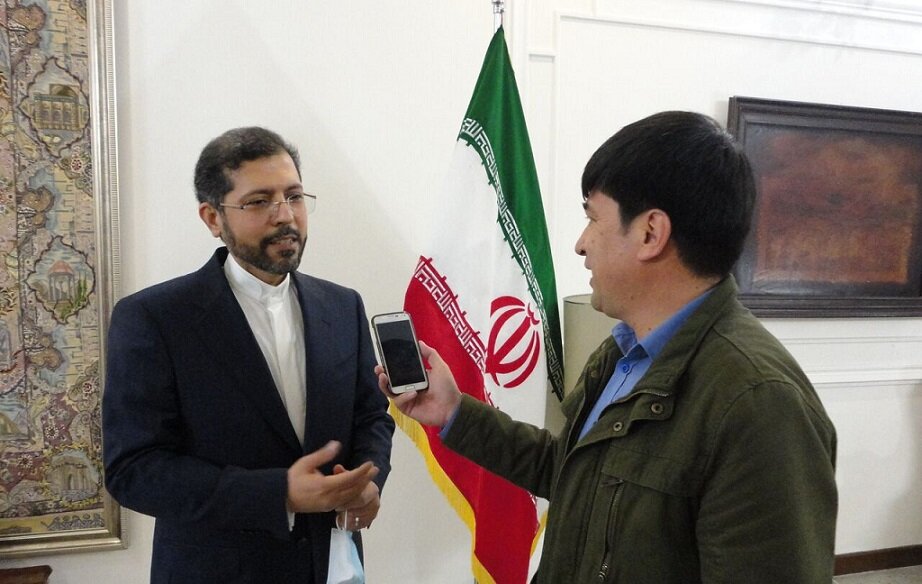U.S. pursuing scorched earth policy in Afghanistan, Iran says

TEHRAN - Saeed Khatibzadeh, the spokesman for Iran’s Foreign Ministry, has accused the United States of trying to destroy Afghanistan’s legal institutions, calling on the U.S. not to follow the “scorched earth policy” in the country.
“Washington is clandestinely trying to destroy Afghanistan’s legal institutions with its irresponsible pullout to create room for its return to the country,” the spokesman told the Islamic Republic News Agency (IRNA). “The U.S. is trying to leave Afghanistan in a way that once again the country gets stuck in armed conflict.”
Khatibzadeh added, “What the U.S. has done in Afghanistan is that it invaded Afghanistan, killed its people and now it leaves behind an ominous heritage by destroying its legal institutions upon leaving – hoping that one day it will return to the country. The U.S., as an invader, must follow international law and not follow the ‘scorched earth policy’ upon leaving.”
The U.S. has recently announced that it’s planning to cut American troop numbers in Afghanistan and Iraq by mid-January.
“By January 15, our force size in Afghanistan will be 2,500 troops. Our force size in Iraq will also be 2,500 by that same date,” Acting Secretary of Defense Chris Miller told reporters in mid-November.
The U.S. is also trying to broker a peace deal between the Afghan government and the Taliban in a bid to pave the way for American withdrawal from Afghanistan but the effort has yet to yield results. During his recent tour of the region, U.S. Secretary of State Mike Pompeo met with the peace negotiators of the Taliban and the Afghan government in Doha, Qatar.
“The fact is that Iran believes in real peace talks; all parties and groups in Afghanistan should be able to negotiate in a totally inter-Afghan process,” Khatibzadeh said, adding that Iran tries its best for that to happen.
The spokesman made the remarks during an official visit to Kabul. Commenting on the goal of his visit, Khatibzadeh said Afghanistan is a high priority for Iran’s foreign policy and the ties between the two countries are based on good neighborliness.
He pointed out that Iranian and Afghan officials pay regular visits to each other’s country, adding that a couple of days ago Afghanistan’s deputy foreign minister paid a visit to Tehran and discussed the comprehensive document on strategic cooperation between Iran and Afghanistan. Khatibzadeh noted that he was present in the meeting with the Afghan deputy foreign minister to discuss bilateral issues, expansion of cultural and public diplomacy. He also said that he had a meeting with the head of Afghanistan’s High Council for National Reconciliation Abdullah Abdullah and discussed cultural and public diplomacy issues.
According to Khatibzadeh, Iran tries to be effective and contribute to the Afghan peace process.
“The Islamic Republic of Iran is the only country that has paid a high price for the Islamic Republic of Afghanistan to be respected as a political structure. Today, the White House regime has made its utmost to destroy Afghanistan's future through clandestine deals, but Iran is trying to preserve the current structures of the Islamic Republic of Afghanistan, the rights of minorities, the rights of religions, and what the Afghan people have achieved painstakingly,” Khatibzadeh said, adding that Iran seeks to establish good relations between Tehran and Kabul.
Iran’s efforts concerning the Afghan peace process have intensified in recent weeks. Ebrahim Taherian Fard, the special envoy of Iran's foreign minister for Afghanistan, paid a visit to Kabul last week and met with Afghan Foreign Minister Mohammad Hanif Atmar. During the meeting, the envoy expressed Iran’s support for the Afghan peace talks, calling the talks “important.”
Atmar, in return, expressed appreciation for Iran’s “brotherly and sincere” support for the people and government of Afghanistan, according to a statement issued by Afghanistan’s Foreign Ministry. The chief Afghan diplomat also briefed the Iranian envoy on the latest developments surrounding the Afghan peace process.
Earlier in October, Abdullah Abdullah traveled to Iran to seek support for the Afghan peace talks. He met with several high-ranking Iranian officials including the president, foreign minister, Parliament speaker, and secretary of the Supreme National Security Council.
“The leaders of the Islamic Republic of Iran consider the success of peace in Afghanistan to be in the interest of the region and the world and they comprehensively support a peace process that is led and managed by Afghanistan,” Abdullah was quoted by the Fars news agency as saying during his two-day visit to Tehran.
